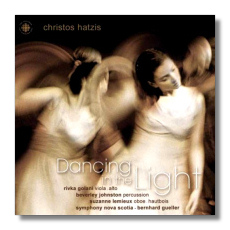
The Internet's Premier Classical Music Source
Related Links
- Hatzis Reviews
- Latest Reviews
- More Reviews
-
By Composer
-
Collections
DVD & Blu-ray
Books
Concert Reviews
Articles/Interviews
Software
Audio
Search Amazon
Recommended Links
Site News
 CD Review
CD Review
Christos Hatzis

Dancing In The Light
- Pyrrichean Dances 1
- Telluric Dances 2
1 Rivka Golani, viola
1 Beverley Johnston, percussion
2 Suzanne Lemieux, oboe
Symphony Nova Scotia/Bernhard Gueller
CBC Records SMCD5243 DDD 70:21
Canadian composer Christos Hatzis first came to my attention in 1999 with an outstanding Centrediscs CD of electroacoustic music ("Byzantium"), also reviewed here. (Unfortunately, it now seems to be out of print.) Since then, I've heard several other discs of his music, and I've been increasingly impressed with his breadth and his imagination. Here's a composer who writes music that is unmistakably his own; there's no mistaking Hatzis with anyone else.
Pyrrichean Dances is effectively a double concerto for viola, percussion, and orchestra, and similarly, Telluric Dances is an oboe concerto, although it too gives a prominent role to the percussion. Hatzis describes these two works as "complementary," and explains that they incorporate dance in the sense of "dance as an expression of life." There's a yin and yang quality here. The word "Pyrrichean" suggests conflict and war, and indeed, an aggressive streak runs through the Pyrrichean Dances. By the same token, "Telluric" is an adjective relating to the Earth, and there's an order, sanity, and, if you will, groundedness to this work which will be very satisfying to many listeners, I think.
Specifically, the four Pyrrichean Dances ("Broken Mirrors," "Postcards from the (un)Holy Land," "Love Among the Ruins," and "Worlds in Collision") were inspired by catastrophic situations in recent world history (the Palestinian indifada, the 9/11 attacks on the United States), and by the idea of cultures in conflict… for example, the frictions between nationalism and the "New World Order." (Hatzis's musical representations of the latter in the last movement leave the listener with no doubt as to his opinions on this phenomenon.) Not only is Hatzis' writing for the two soloists incredibly evocative and virtuosic, his creativity with orchestral timbres has few parallels among today's composers. Pyrrichean Dances is one of those rare modern works that neither talks down to listeners, nor submerges them under waves of irony or postmodernism, yet still has the ability to pull them in.
I think the same is even more true of the three Telluric Dances: "Snake Dance," "Eagle Dance," and "Dancing in the Light." (The latter gives this CD its overall title.) In this work, Hatzis draws upon inspiration from the Mediterranean region in general, including from his own Greek heritage. Here, the oboe sometimes serves as a proxy for instruments native to Greece and the Middle Eastern countries. The "Snake Dance," mysterious, exotic, and ever so slightly menacing, had me thinking of faraway market places where Western eyes seldom penetrate. The "Eagle Dance," in spite of the occasional brashness of its scoring, has tremendous dignity, and yet it moves forward with unstoppable power. "Dancing in the Light" is based on a folk dance associated with the Baltic region. Classical music has a long history of composers "dressing up" folk music, but Hatzis treats his materials with great freedom. Also, I must say that at 4:38 in this last movement, there is a passage which is so gorgeously "Hollywood," that I don't see how anyone could resist it. With its impact on the head, Pyrrichean Dances might bring down the house. Telluric Dances will almost certainly do the same, but through its actions on the feet and heart. Not since John Corigliano's Oboe Concerto has there been such a work, and truth to tell, I think that Hatzis' surpasses it.
Pyrrichean Dances was commissioned for Golani and Johnston, the soloists heard here, and similarly, Telluric Dances was intended, at least in part, for Symphony Nova Scotia and Suzanne Lemieux, the orchestra's principal oboist. These are world-class performers, and Symphony Nova Scotia is truly an impressive ensemble. (For several years they were conducted by Georg Tintner, who probably is most famous for his Bruckner cycle on Naxos. Unfortunately, CBC Records' booklet note twice misspells his name as "Titner.") The engineering on this CD will beg you to turn up the volume, and you will be glad that you did.
These works deserve to be heard and recorded frequently. Given the way classical music is today, it is unlikely that they will be given their due. Grab this CD while you can.
Copyright © 2007, Raymond Tuttle




















